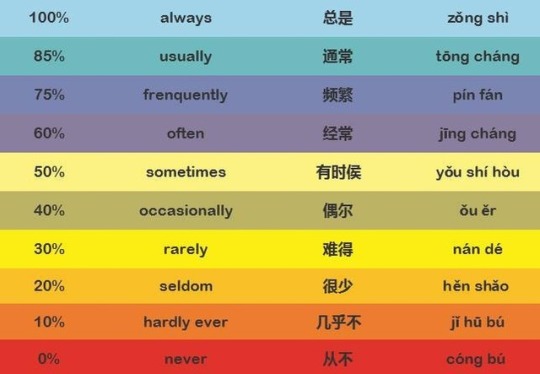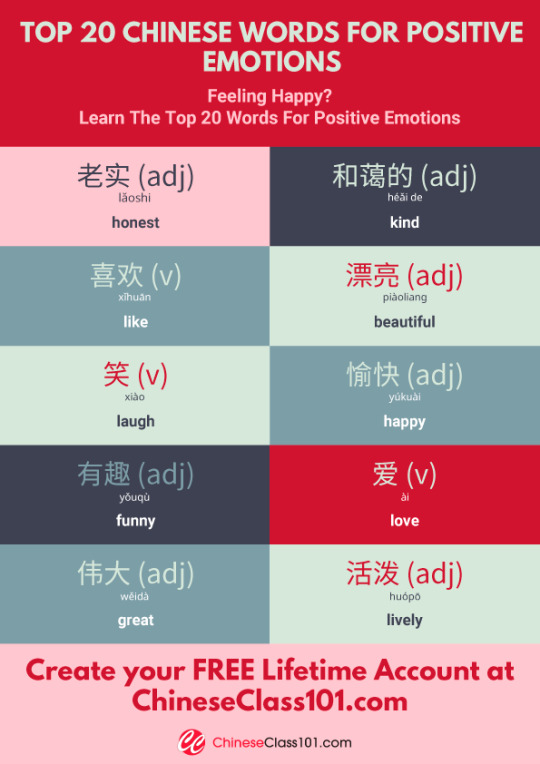Text
Words Meaning “if” in Chinese
There are so many express to say “if” (in the sense of “supposing that”) in Chinese! I’ve gathered all the ways I could think of below. Some are more formal or less formal or might have other uses/meanings. The example sentences are from Pleco.
如果 rúguǒ - if / in case / in the event that
你如果要来,请事先告诉我。
要是 yàoshi - if (colloquial)
要是下雨怎么办?
假如 jiǎrú - if
假如明天开会,准备工作来得及吗?
假使 jiǎshǐ - if / in case / suppose / given
假使他到这儿来,通知我一下。
倘若 tǎngruò - provided that / supposing that / if (literary)
倘若错过这个机会,你会后悔的。
若是 ruòshì - if (literary)
各位若是有不同意见,请即提出。
假若 jiǎruò - if / supposing / in case
假若我来不了,我会通知你的。
的话 dehuà - if (colloquial, coming after a conditional clause)
有事的话,就不要来了。
假设 jiǎshè - to suppose / to presume / to assume / supposing that … / if / hypothesis / conjecture
假设你赢了一百万元,你会买什么?
若 ruò - to seem / like / as / if (literary)
若有问题,请及时与我电话联系。
倘 tǎng - if / supposing / in case (literary)
倘能如此,就最好不过了。
要 yào - important / vital / to want / to ask for / will / going to (as future auxiliary) / may / must / (used in a comparison) must be / probably / if
我要不回来,请替我说一声。
如 rú - as / as if / such as / if (literary)
如妥善处理,问题不难解决。
Here are some others that were listed in the dictionary but that I haven’t actually encountered:
如若、如其、设若、若果、倘或、倘然、倘使、若然、设使、倘使
374 notes
·
View notes
Photo
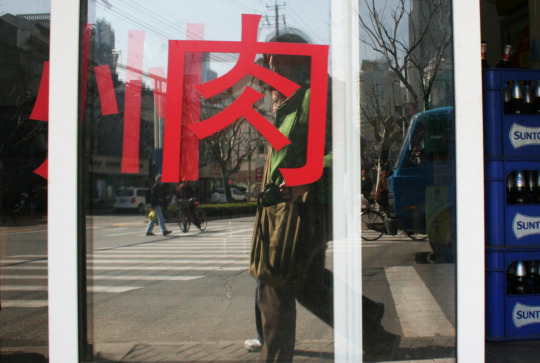
肉 = ròu = meat, flesh
肉 is all about meaty stuff!
鸡肉 (jī ròu) is chicken meat, pork is 猪肉 (zhū ròu), beef is 牛肉 (niú ròu)… basically, one puts 肉 next to an animal to refer to the meat of that animal. Meat can also be lean 瘦肉 (shòu ròu) or fatty 肥肉 (féi ròu), it can be raw 生肉 (shēng ròu), minced 碎肉 (suì ròu) or shaped into meatballs 肉丸 (ròu wán)…
And of course, this character shows up on all menus featuring meat dishes like twice cooked pork 回锅肉 (huí guō ròu) or sweet and sour pork 咕咾肉 (gū lǎo ròu).
The Chinese equivalent of the European “Let them eat cake“ is 何不食肉糜 (hé bù shí ròu mí) — which literally means “Why don’t they eat meat?”. It was said by emperor Hui of Jin when told that his people didn’t have enough rice to eat. 🙄
85 notes
·
View notes
Text
Basic Radical Lists
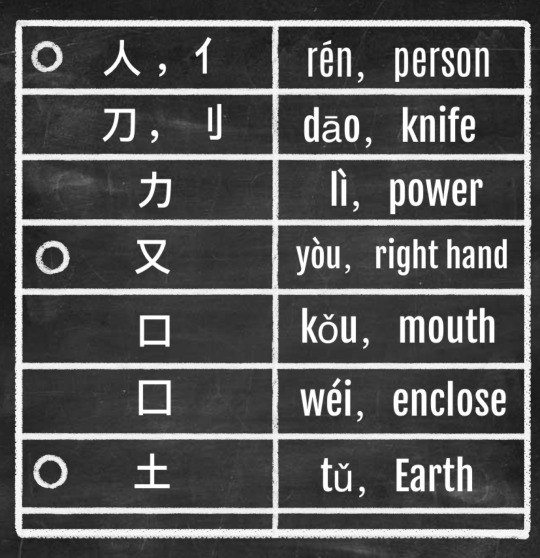
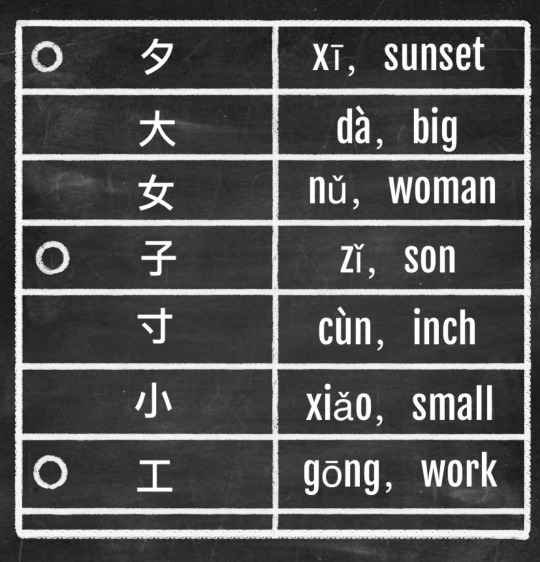
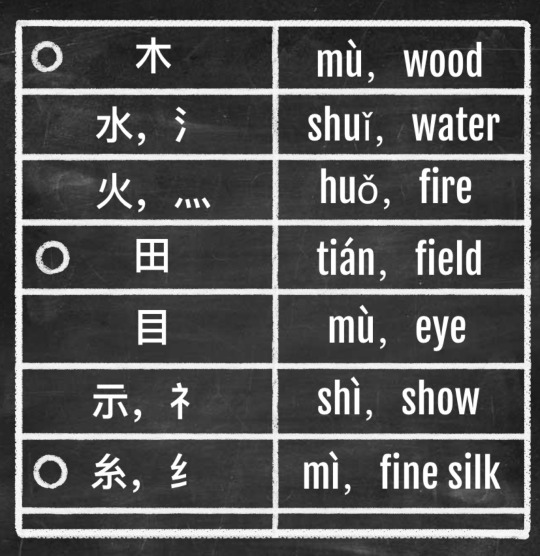
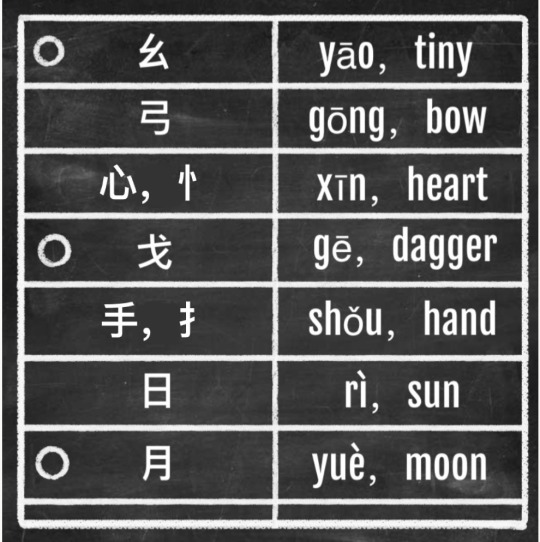
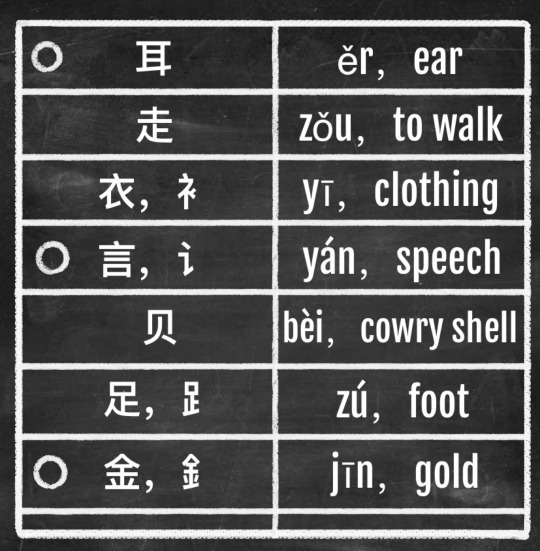
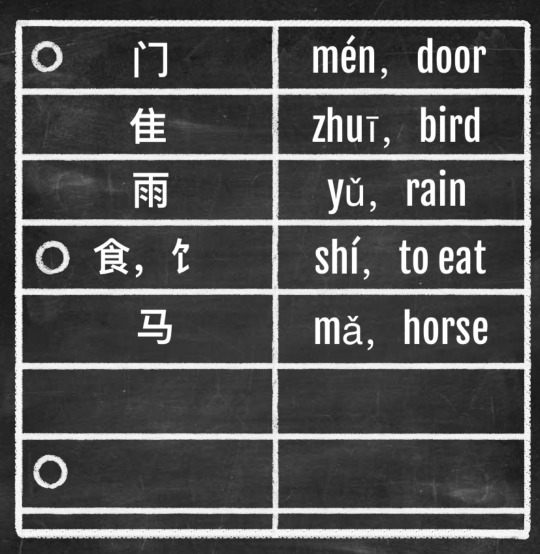
What are Radicals?
Radicals are the basically building blocks of Chinese characters. Either a character is a radical, or it has a radical in it.
There are currently 214 radicals, but this list of 40 will help you get started.
Radicals help separate and organize the characters. Chinese dictionaries organize each character under the radical that it uses.
Here’s how radicals work :
人 [rèn] is a basic radical. 人 means person, as we all hopefully know. Taking this radical and placing it into another character, that 人 will suddenly look like this: 亻。 This partial character cannot stand alone. Do you recognize it from somewhere?
That’s right! We see the 人 radical in 你, 们, and 他。There are more characters with this radical, but we’ll keep it simple for now.
You might also notice the the radical will sometimes relate directly with the character it’s in. That’s why they are separated in this way. It’s not always the case, but more times than not, you’ll see a pattern.
Radicals help learners guess at both meaning and sound. You might not know that 你 means you, but you see the person (人) radical and automatically connect them.
Predicting Sound comes a bit later. People fluent in Chinese can look at a character and usually guess at an unfamiliar character and not be so far off what it actually sounds like. As second language learners slowly grasp the language, they might also notice this. It’s because we see the character and connect it with a radical, or another similar character that may have a similar sound. Not tone, but sound.
All in all, radicals are incredibly important. Memorizing radicals should always be the first step in learning Mandarin because it just makes it so much easier.
MEMORIZE THESE BEFORE LEARNING OTHER WORDS. I kid you not, it’s so much easier to learn once you know what your looking at character-wise. It’s going to be boring but stick it out.
Below are some helpful things to look at or watch to help learn radicals quicker:
Click on any radical to see its definition, and characters that contain that radical: https://www.chinese-tools.com/tools/sinograms.html?r
Splits characters into what radicals they are made out of: http://zhongwen.com/
This is super long, but gives each radical, pinyin, translation-English AND Spanish, stroke order/number, and examples of the radical in other characters. Also, nice overall vibes in the background. https://m.youtube.com/watch?v=66hsy5cPyco
youtube
81 notes
·
View notes
Text
Cách dùng 的
I/ Kết cấu nhấn mạnh “是…的” / “shì…de”:
S + 是 + trạng ngữ chỉ thời gian + V + 的
- Dùng để nhấn mạnh thời gian/ địa điểm/ phương thức của một hành động đã xảy ra trong quá khứ, thể hiện người hỏi hay người nói đang muốn nhấn mạnh vấn đề gì trong giao tiếp.
我是坐火车来的
wǒ shì zuò huǒchē lái de
Tôi đi tàu hỏa đến đây (Nhấn mạnh phương thức)
他是十点睡的
tā shì shí diǎn shuì dē
Anh ấy đi ngủ lúc 10h (Nhấn mạnh thời gian)
+ Trong câu khẳng định, có thể lược bỏ “是”.
+ Dạng phủ định của “是…的” là “不是…的”, trong đó “是” không thể lược bỏ
+ Nếu động từ mang theo tân ngữ, thì 的 có thể đặt trước hoặc sau tân ngữ
Ví dụ: (1) 我们是 / 昨天 / 去 / 的 / 图书馆。
Wǒmen shì míngtiān qù de túshūguǎn.
Hôm qua chúng tôi đi thư viện.
(2) 我们是 / 昨天 / 去 / 图书馆 / 的。
Wǒmen shì míngtiān qù túshūguǎn de.
Chúng tôi đi thư viện vào hôm qua.
II/ Định ngữ biểu thị quan hệ sở hữu, hạn định
III/ Khi tính từ, cụm tính từ hoặc tính từ 2 âm tiết làm định ngữ dùng để miêu tả phải có “的” (tính từ đơn âm tiết làm định ngữ không cần “的”)
Ví dụ: (1) 他是好人
Ta shì hǎo rén (好: tính từ đơn âm tiết)
(2) 他是很好的人
Ta shì hěn hǎo de rén (很好: cụm tính từ)
IV/ Khi định ngữ là cụm chủ - vị, nhất định phải thêm “的”
Ví dụ: (1) 我喜欢吃妈妈做的饭
wǒ xǐhuan chī māma zuò de fàn : Tôi thích ăn cơm mẹ nấu.
(2) 这是姐姐给我的钱
zhè shì jiějie gěi wǒ de qián : Đây là tiền chị tôi cho tôi.
(3) 妈妈做的菜很好吃
Māmā zuò de cài hěn hào chī : Món ăn mà mẹ nấu rất ngon.
(4) 我很喜欢他送我的包
Wǒ hěn xǐhuan tā sòng wǒ de bāo : Tôi rất thích cái túi anh ấy tặng.
V/ Các danh từ, đại từ, động từ, tính từ hoặc cụm từ thêm “的” phía sau, dùng để tỉnh lược danh từ đã được nhắc tới phía trước, giúp câu nói ngắn ngọn hơn. Hay sử dụng trong khẩu ngữ.
Ví dụ: (1) 这本杂志是中文的
zhè běn zázhì shì zhōngwén de
Cuốn tạp chí này là tạp chí tiếng Trung (中文的杂志) (phía sau đã được lược bỏ danh từ 杂志)
(2) 她的书包是红的
tā de shūbāo shì hóng de
Cặp sách của cô ấy là cái màu hồng (红的书包)
(3) A:这是谁的书?
Zhè shì shéi de shū?
Đây là sách của ai?
B:不是我的
Bùshì wǒ de
Không phải của tớ đâu
C:是我的
Shì wǒ de
Của tớ đấy
0 notes
Text
能 vs. 会 vs. 可以
能 (néng), 会 (huì), and 可以 (kě yǐ) are all often translated as “can”, it can be a difficult concept to learn since they all are used differently. some of them can be used interchangeably but for now im only going to cover the basics.
能 (néng) means “to be capable of” as in having the ability or be in the right circumstance to do something。
我喝酒了,所以不能开车。(wǒ hē jiǔ le, suǒ yǐ bù néng kāi chē) - i drank so i wont be able to drive
你能吃三碗米饭吗 ?(nǐ néng chī sān wǎn mǐ fàn ma?) - are you able to eat 3 bowls of rice?
会 (huì) means having the skill to do something through some kind of learning。
你会说中文吗?(nǐ huì shuō zhōng wén ma) - can you speak chinese?
我会弹钢琴。(wǒ huì tán gāng qín) - i can play the piano
可以 (kě yǐ) is used to give or get permission to do something
你可以帮我吗?(nǐ kě yǐ bāng wǒ ma) - can you help me?
我可以走了吗 ?(wǒ kě yǐ zǒu le ma?) - can i leave now?
if there any mistakes pls lmk!!
552 notes
·
View notes
Text
感到/感觉/觉得 - the difference
1. 感到 (verb), usually followed by an adjective or a noun.
EX: 我感到快乐。I feel happy.
我感到他的存在。I feel his existence.
2. 感觉 (verb): to feel Or (noun): feeling
EX: 我的感觉是正确的。My feeling are correct.
我对他没感觉。I don't have any feeling for him.
3. 觉得 can only be (verb): “to think / to feel” , but more often used in casual spoken form.
EX: 我不这样觉得。I don’t think so.
** 觉得 and 感觉 (v) most of the time they are interchangeable
EX: 我觉得这部电影很好 = 我感觉这部电影很好
I feel the film is good.
我觉得很冷 = 我感觉很冷
I feel very cold.
5 notes
·
View notes
Text
Phrase Friday 13
61. 我准备好了.
wǒ zhǔn bèi hǎo le
I’m ready.
62. 离这很近
lí zhè hěn jìn
It’s close to here.
63. 那是不同的
nà shì bù tóng de
That’s different.
64. 不值得
bù zhí dé
It’s not worth it.
65. 这里人很多.
zhè lǐ rén hěn duō
There are many people here.
178 notes
·
View notes
Text
Mandarin exclamative particles and interjections
啊 (a) ah (surprise, just realized something)
呀 (ya) used instead of 啊 when the preceding word ends in a vowel (same meaning as 啊)
唉 (ai) sigh
哦 (ó) oh (ohhh I understand, that’s so)
喔 (ò) oh (aknowleges that you heard something but shows you aren’t happy about it)
诶/欸 (ei) hey (expressed sudden excitement, disappointment or can be used to get someone’s attention)
-I excluded the tone because depending on the context / tone of voice it has different meanings
咦 (yí) a sound that expresses confusion
哇 (wa) wow
哈哈 (hāha) haha
喂 (wéi) hello (on the phone) hey (getting a person’s attention)
嘿 (hēi) hey
嗯 (ēn) expresses agreeement / a groan
蛤 (há) what? huh? (used when you need a clarification or you’re so surprised you can’t believe)
哼 (hēng) hesitation grunt
哎哟 (āiyōu) ugh, ouch, darn it, whoops
哎呀 (āiyā) oh no (complaint / expresses something annoying)
我的天哪 (wǒ de tiān na) oh my god
我的妈呀 (wǒ de mā ya) oh my god (lit. Oh my mother)
真的? (zhēnde) really?
那当然了 (nà dāngrán le) of course, totally agree
太可惜了 (tài kěxī le) what a pity, that’s too bad
这样啊? (zhèyàng a) really? is that so?
原来如此 (yuánláirúcǐ) so that’s how it is
你辛苦了 (nǐ xīnkǔ le) you’ve worked hard (a thanks for efforts)
保重自己 (bǎozhòng zìjǐ) take care of yourself
好好休息 (hǎohǎo xiūxi) get some rest, rest well
那好 (nàhǎo) all right, ok (ends conversation)
就这样吧 (jiù zhèyàng ba) ok that’s all for now (ends conversation)
1K notes
·
View notes
Photo
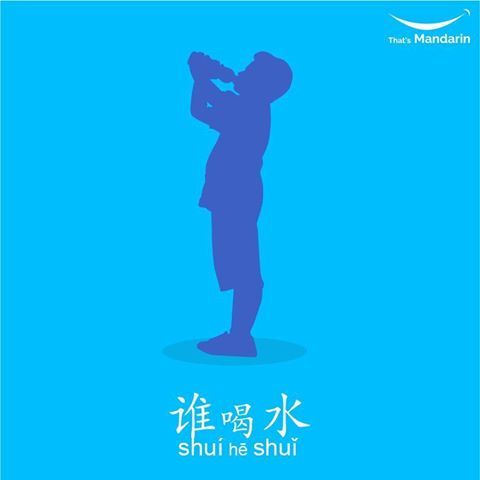
Today’s sentence is:
谁喝水?
shuí hē shuǐ ?
Who wants some water?
Here 水 shuǐ means water and 谁shuí means who. 水 shuǐ and 谁shuí have the same syllable.
你一天喝几杯水?
nǐ yī tiān hē jǐ bēi shuǐ
1 note
·
View note
Photo
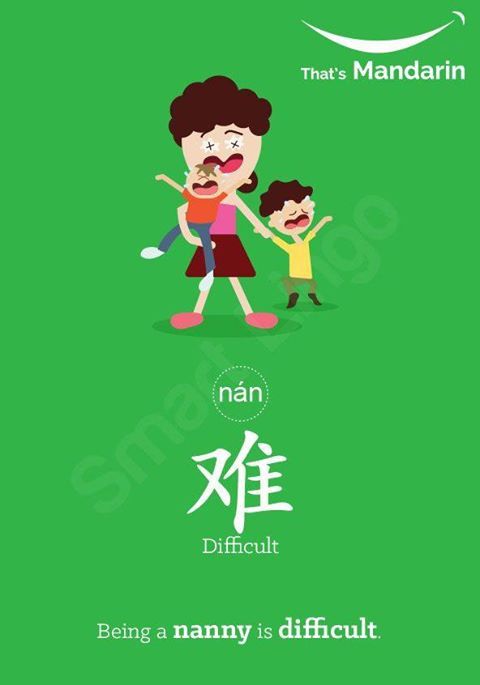
Today’s link word is:
难
diàn huà
Difficult
这道题太难了,我不会。
zhè dào tí tài nán le ,wǒ bú huì
This problem is too difficult that I can’t figure it out.
#thatsmandarin
0 notes
Photo

Today’s sentence is:
告诉我你的号码,好吗?
gào sù wǒ nǐ de hào mǎ ,hǎo ma
Can you tell me your phone number?
号码 hào mǎ and 好吗 hǎo ma have the same syllable.
0 notes
Text
Chinese vocab 1
问候 wèn hòu - greeting
请 qǐng - please
问 wèn - ask
在 zài - in
家 jiā - home
吗 ma - interrogative particle
进 jìn - come in
你 nǐ - you
好 hǎo - good
你好 nǐ hǎo - hello
好久 hǎojiǔ - long time
不 bù - no, not (negative)
见 jiàn - see
我 wǒ - I
很 hěn - very
呢 ne - interrogative particle
也 yě - also
坐 zuò - sit
吃 chī - eat
了 le - past tense
喝 hē - drink
茶 chá - tea
还是 hái shì - or
咖啡 kā fēi - coffee
谢谢 xiè xie - thank you
不客气 bù kè qì - you’re welcome
270 notes
·
View notes
